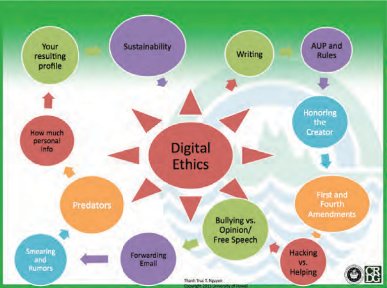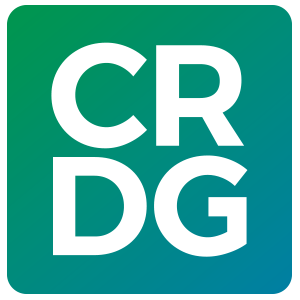23 Jul School Internet Safety Initiative
 CRDG’s learning technologies researchers continued work on their School Internet Safety Initiative with a series of professional development sessions based on their research with the US Department of Justice’s Office for Juvenile Justice and Delinquency Prevention and their work on the curriculum Developing WISE Kids: Web and Internet Safe Educated Kids.
CRDG’s learning technologies researchers continued work on their School Internet Safety Initiative with a series of professional development sessions based on their research with the US Department of Justice’s Office for Juvenile Justice and Delinquency Prevention and their work on the curriculum Developing WISE Kids: Web and Internet Safe Educated Kids.
Curriculum Focuses on Digital Citizenship
The WISE Kids curriculum is based on the core concept of digital citizenship and addresses many of the issues students face as they learn to function in a global communication environment. Principal Investigator Thanh Truc Nguyen described the way that, even though the framework was completed in 2009 and has remained largely the same, the curriculum continues to change every year. She noted how much modes of communication continue to change as mobile computing becomes more common and we are able to upload content to the Internet instantly and from anywhere. The curriculum addresses such wide-ranging topics as communication skills, cultural norms and differences, personal safety, boundaries between public and private speech and behavior, and carbon footprint. For most of these issues, there is both a strong generational element to attitudes and behaviors and a large shift in the concept of privacy. The curriculum is designed, not to impose ethics, but to facilitate the process by which students build their own sense of right and wrong as they construct their identity both online and off. The chart shows the thirteen elements of the WISE Kids curriculum framework.
New Professional Development Series
With the rapidly changing technology environment, it is as important for teachers and administrators to keep learning as it is for students. For teachers, the field of technological pedagogical content knowledge (see http://www.tpck. org/) focuses on how teachers can use the new technologies to enhance teaching strategies they already do well. But for both teachers and administrators, there is also an urgent and ongoing need to know what the laws and current practices are with regard to using technology and to sharing information. Nguyen described the idea of innocent sharing, something that teachers might warn students against. But this might also happen when an elementary teacher creates a class website so parents can keep up on what’s going on in the class. It is important for teachers and administrators to be aware of safety concerns since these kinds of sites inadvertently provide access to children’s names and routines that enables strangers to get close to them.
There are also a whole range of issues around the area of copyright and fair use, balancing privacy laws that prevent the sharing of personal identifiable information with first amendment issues of free speech, and the risks and liabilities inherent in allowing access to school networks. And lately, there is even the issue of electrical load as more students bring their smart phones and other devices to school and plug them in. In order to address new issues as they arise, the learning technologies team has created the following workshops for teachers, administrators, and parents.
Is Your School Modeling Digital Citizenship?
This workshop considers the definition of citizenship and digital citizenship; provides a review the International Society for Technology in Education (ISTE) standards and 21st century learning guidelines; introduces participants to the laws on cyberbullying, sexting, piracy, and impersonation; encourages reflection on school’s technology integration structure; and reviews strategies and resources to model digital citizenship.
Digital Efficacy and Teaching Pedagogy
Part of the current trend in education is to collaborate online and explore creative avenues in digital forums. Teachers often encourage students to share documents in the cloud, create ePortfolios, collaborate chat rooms, communicate with “pen pals” overseas, and populate blogs with reflections and musings. This workshop covers some current technology tools and makes recommendations on good practice.
Cyberbullying, Piracy, Impersonation, and Sexting: A School Discussion
This workshop shares practical advice for schools from a non-legal standpoint, increasing teacher and administrator awareness of the laws as they relate to adults and students.
Parent and Teacher Partnerships in Digital Citizenship
Digital citizenship is arguably as important in home environments as it is in schools. The purpose of this workshop is to allow schools and parents to work together in school teams to 1) learn more about cyberbullying and sexting awareness and prevention, and 2) work towards creating parent-school partnerships focused on cybersafety.
Developing WISE Kids: Web and Internet Safe Educated Kids
How do we develop a child’s sense of ethics so that they are both safe and responsible when they are online? Where does a school begin? In this workshop, participants are introduced to CRDG’s WISE framework and consider how it can be adopted and/or reframed for their school.
Your School’s AUP: Informal discussion on technology access and the law
Every school is responsible for creating a safe learning environment, and this includes the online learning environment. The acceptable use policy (AUP) is the first place that schools look for guidance. This workshop considers the two cases decided by the US Supreme Court related to the AUP and the two federal laws, the Children’s Internet Protection Act (CIPA) and the Children’s Online Privacy Protection Act (COPPA), that should guide a school’s mission for online access and practices that teachers and students use to share their work online.




